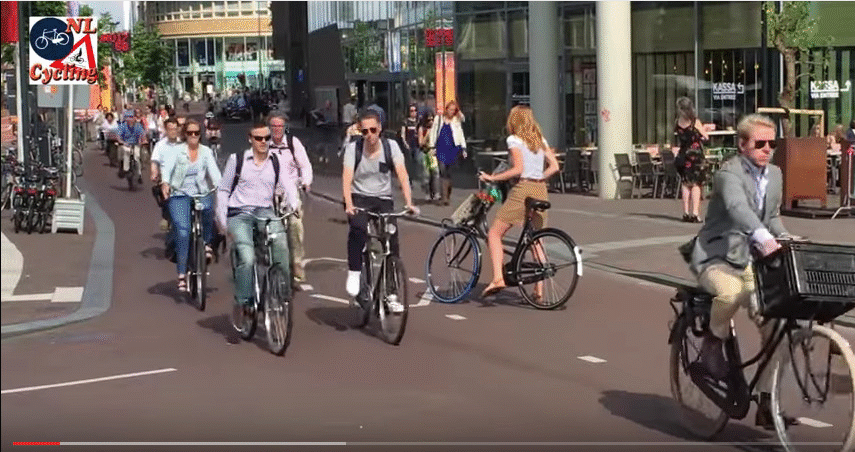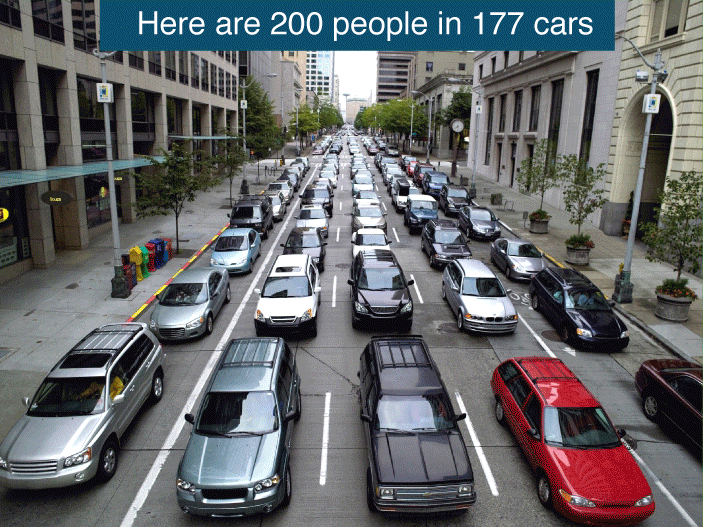In a second Transportation Revolution, the people of The Netherlands took back their streets. They changed their city. Here in Hamilton, we can too!
By Kevin Love
Published June 13, 2017
On June 5, Hamilton City Councillor Lloyd Ferguson was quoted by CBC News as saying about traffic violence, "You don't expect the rest of the city to adjust the street to accommodate your personal needs when you made the decision to move there in the first place."
In Canada, mobility is not considered a "personal need," but a basic human right. The United Nations has enshrined "Freedom of Movement" as Article 13 of the Universal Declaration of Human Rights.
In order to provide this freedom of movement to all people, streets in The Netherlands were systematically adjusted in a Second Transportation Revolution.
The first revolution was when streets were transformed in the post-WWII era to be car-dominated. The second revolution was when streets were taken back so that now streets are for people, not cars.
The effect of the Second Transportation Revolution is to increase safety and decrease traffic congestion. A larger number of people can travel faster and with greater safety.
An example of a very busy street that has been transformed to transport a larger number of people with increased safety and speed is Vredenburg in Utrecht.
Vredenburg is the main east-west street in Utrecht. Utrecht has a population of 331,000 and is part of the Randstad metropolitan area which has a population of 7.1 million people.
An excellent description and video of Vredenburg has been created by Mark Wagenbuur.
When watching the video, please play close attention to the before and after.
The "before" may be found in the video from 0:28-038. This ten seconds of "before" showing the street in 1966 are truly frightening! Those lanes of scary car traffic look as bad as Main and King streets in Hamilton today.

Vradenberg, Utrecht, before and after the Second Transportation Revolution (Image Credit: YouTube video stills)
The rest of the video shows what Main and King streets in Hamilton can become if we have the courage to create a better future.
Of course, the current volume of traffic on Vredenburg could never be carried in such a space-inefficient method of transportation as driving cars.

Space needed for 200 people in cars, on bikes, on buses and on LRT (Image Credit: Washington Post)
The people of Utrecht have solved their congestion, and safety problems. Vredenburg is a busy street and a safe street.
In a second Transportation Revolution, the people of The Netherlands took back their streets. They changed their city. Here in Hamilton, we can too!
By CareBear (registered) | Posted June 13, 2017 at 11:16:11
Amazing! Could you imagine the congestion if all those people were in cars instead of on bikes or walking! Brilliant design and addresses so many problems, not just transportation (family economic, social connections, environmental, noise pollution, increased activity levels, and on and on).
By beancounter (registered) | Posted June 13, 2017 at 14:57:44
I left the Netherlands in 1956. Maybe I should have stuck around.
By GWW (registered) | Posted June 13, 2017 at 19:45:30
Different City, with different circumstances. How many single family dwellings with front yards and backyards in that city, and/or what is is the density? I don't believe most older cities in Europe are comparable to a City like Hamilton.
By KevinLove (registered) | Posted June 13, 2017 at 23:40:40 in reply to Comment 121610
The point of the article is to demonstrate that busy downtown streets can be safe streets. The goal was to show what streets such as Main Street downtown could look like. Not too many front yards on Main Street in downtown Hamilton!
If you want to see how to transform for safety a neighbourhood of single family dwellings with front yards and backyards, you do not have to go very far. Just to the Toronto Islands. If you want to see a new, modern suburb, take a look at Houten in The Netherlands or Vauban in Germany.
The point is that we can build or rebuild all parts of Hamilton in accordance with the Second Transportation Revolution to make them safe and better places to live. Even semi-rural areas, such as where Jasmin Hanif was killed can be made safe for children to go to school. An example of that is Culemborg in The Netherlands.
All of Hamilton can be made safe and a great place to live for children and all other people. We just need the courage to do it!
Comment edited by KevinLove on 2017-06-13 23:53:19
By RobF (registered) | Posted June 13, 2017 at 23:08:47 in reply to Comment 121610
There is a lot we can learn from how the Dutch have addressed the question of reducing the privilege accorded to automobility in planning, street/road design, and built environments.
Will we need to do things a little different? Sure. But the basic lesson is that if you want a better modal split, pedestrian and cycling friendly streets, and vibrant, welcoming urban spaces you need to de-prioritize the car in the mix ... they still drive cars and trucks in the Netherlands and most other European countries, but realize that it has a cost and make accommodation for unbridled automobility is impractical and ensures that built environments work dramatically less well for everyone not in a car ... including those who drive (they eventually do get out of the car).
Comment edited by RobF on 2017-06-13 23:10:29
You must be logged in to comment.
There are no upcoming events right now.
Why not post one?